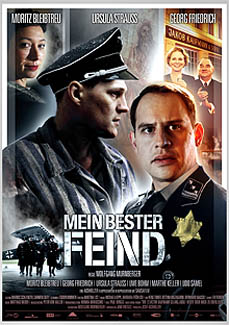
Starts September 1
Original language: German
 The Kaufmanns – father, mother and son Victor (Moritz Bleibtreu) – are a rich Jewish family with a successful art gallery in Vienna. They abandoned their gallery in Nuremberg due to the rise of Hitler. Sadly, National Socialism has followed them to Austria and a new shock is on the horizon: their foster son, Rudi Smekal (Georg Friedrich), son of their long-time and now deceased housekeeper, has joined the Nazi party. Faced with the chance to distinguish himself with the SS, he leaks information about a 400-year-old Michelangelo painting in a secret room in the Kaufmann house – something only a “son” of the family could know. Not stupid, Mr. Kaufmann plans ahead: he arranges for two fake copies to be made and he writes over all his possessions to Lena – the future daughter-in-law. From there the story proceeds in jumps and starts. A Sturmführer confiscates the painting. All three Kaufmanns are sent to a concentration camp. Lena aligns herself with Rudi. As expected, the Michelangelo is a fake; Rudi, who is now in hot water with his boss, fetches Victor from concentration camp squalor with the intention to locate the genuine article. On their flight to headquarters, the plane crashes. Victor exchanges his prisoner’s pyjamas for Rudi’s Nazi uniform, easily done since Rudi is injured and cannot defend himself. With reversed roles it gets complicated, as Victor really doesn’t know that much about impersonating a Nazi. By the end of the film and further role reversals, you will have guessed the location of the real Michelangelo and perhaps even have guessed the satisfactory ending.
The Kaufmanns – father, mother and son Victor (Moritz Bleibtreu) – are a rich Jewish family with a successful art gallery in Vienna. They abandoned their gallery in Nuremberg due to the rise of Hitler. Sadly, National Socialism has followed them to Austria and a new shock is on the horizon: their foster son, Rudi Smekal (Georg Friedrich), son of their long-time and now deceased housekeeper, has joined the Nazi party. Faced with the chance to distinguish himself with the SS, he leaks information about a 400-year-old Michelangelo painting in a secret room in the Kaufmann house – something only a “son” of the family could know. Not stupid, Mr. Kaufmann plans ahead: he arranges for two fake copies to be made and he writes over all his possessions to Lena – the future daughter-in-law. From there the story proceeds in jumps and starts. A Sturmführer confiscates the painting. All three Kaufmanns are sent to a concentration camp. Lena aligns herself with Rudi. As expected, the Michelangelo is a fake; Rudi, who is now in hot water with his boss, fetches Victor from concentration camp squalor with the intention to locate the genuine article. On their flight to headquarters, the plane crashes. Victor exchanges his prisoner’s pyjamas for Rudi’s Nazi uniform, easily done since Rudi is injured and cannot defend himself. With reversed roles it gets complicated, as Victor really doesn’t know that much about impersonating a Nazi. By the end of the film and further role reversals, you will have guessed the location of the real Michelangelo and perhaps even have guessed the satisfactory ending.
This film by Austrian Wolfgang Mumberger played at the 2011 Berlinale to a huge audience. It is fast-moving, sometimes humorously confusing, and well-acted by all. I especially liked the art expert, who, with obvious joy, twice broke the news that the faked art work could never be a gift for Mussolini. Every year there seems to be at least one film about World War II, so Nazi uniforms and persecutions are nothing new. However, humorous films on this topic are rare and this one can be compared to Life is Beautiful from 1997. If you enjoyed that Italian film, i.e., could laugh about concentration camp and Nazis, you will appreciate My Best Enemy. Based on the best-selling book by Paul Hengge Wie es Victor Kaufmann gelang doch noch Adolf Hitler zu überleben (How Victor Kaufmann managed to survive Adolf Hitler).
